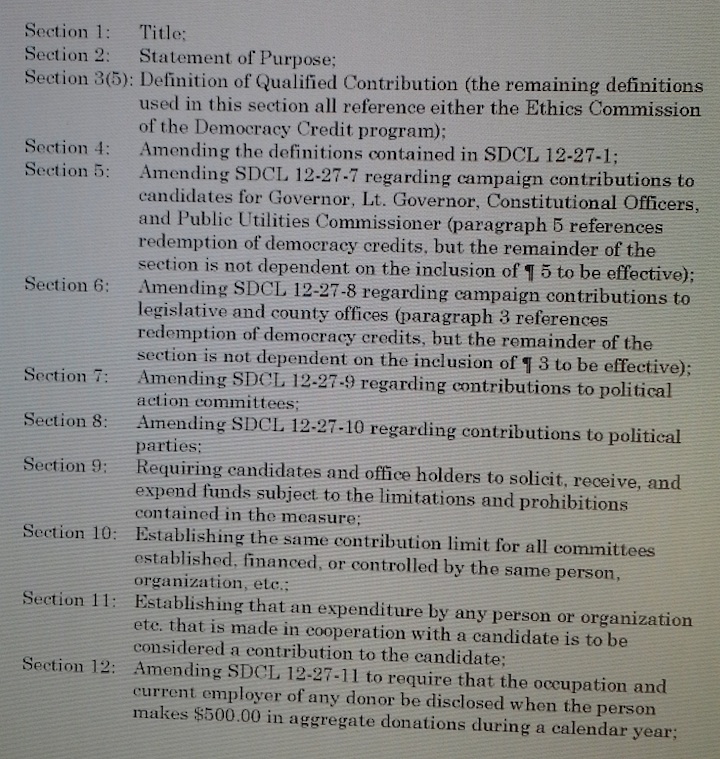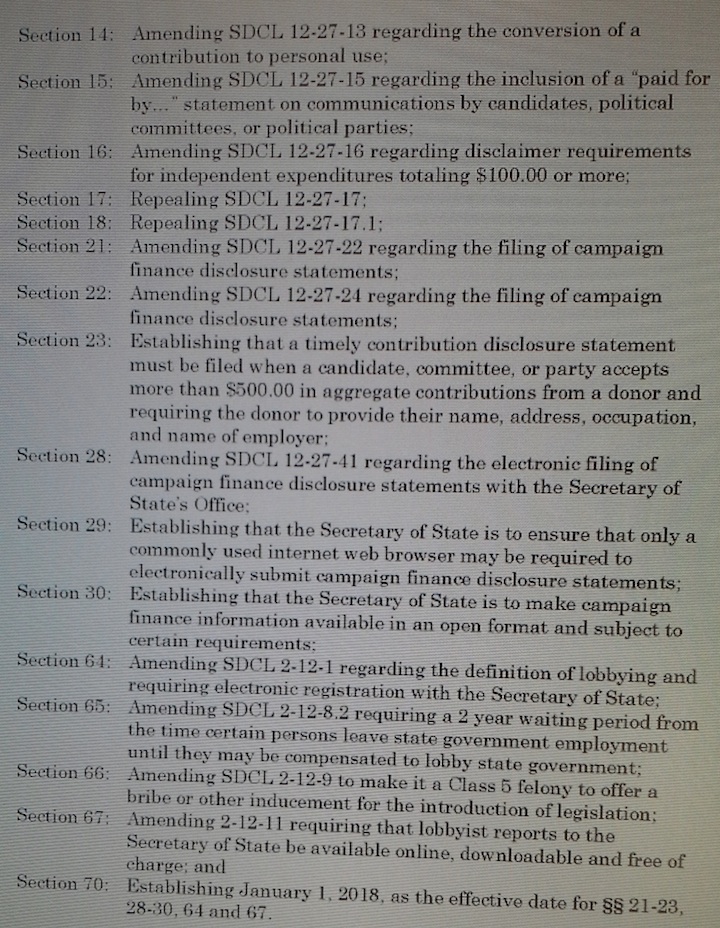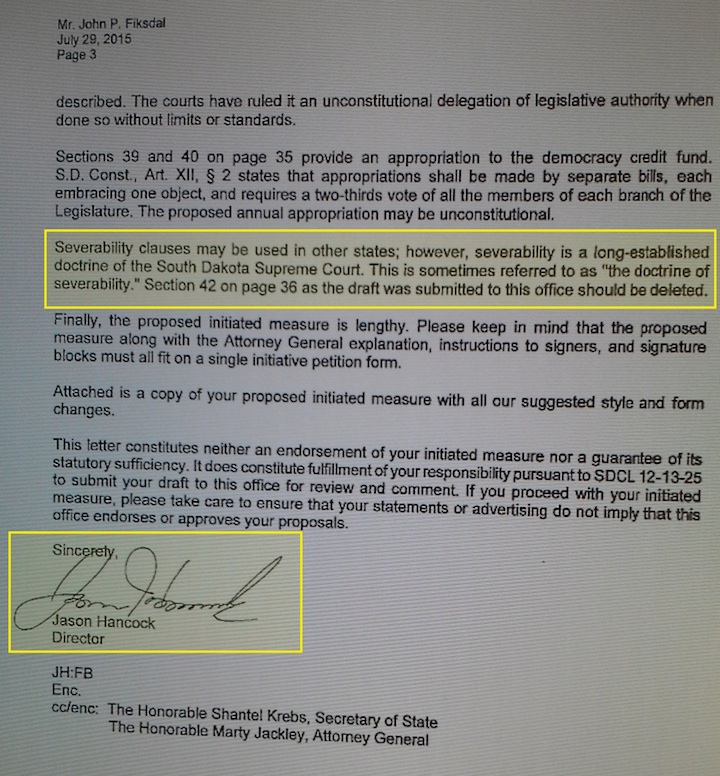On December 8, Judge Mark Barnett enjoined Initiated Measure 22, deeming the funding for the Democracy Credits, the state ethics commission, and the limit on gifts from lobbyists to public officials unconstitutional.
But IM22 has 70 sections, and Attorney General Marty Jackley says a lot of those sections are perfectly constitutional. In a court filing last week, A.G. Jackley (through Assistant A.G. Steven R. Blair, who does the writing) asked Judge Barnett to amend his order and allow 28 of those 70 sections to be enacted:


Not all of these sections matter much. Sections 1 and 2 are mere title and purpose, with no practical impact. The definition of “qualified contribution” Jackley would restore from Section 3 is redundant with the definition in Section 4 and is relevant only to the Democracy Credits that Jackley would leave enjoined.
The additional campaign finance reports and electronic reporting requirements in Sections 21–23 and 28–30 don’t kick in until 2018, but their reinstatement would require the Secretary of State’s office to plan ahead. Also delayed by IM 22’s Sction 70 are the new electronic lobbyist registration and database download capability of Sections 64 and 67.
If Judge Barnett does approve the state’s motion, what goes into effect immediately?
- Lower limits on contributions to statewide, legislative, and count candidates and parties and PACs.
- End of shell committees created by the same entity to evade contribution limits.
- New limits and reporting requirements on independent communications.
- Extension of time elected officials must wait to become lobbyists from one year to two, plus extension of that restriction to appointed officers, state agency and division directors, and highest paid staffers in those offices.
- Increase of penalty for bribes and threats to influence legislation or legislators from Class 1 misdemeanor to Class 5 felony.
The Republican legislators who sued to protect their free lunches argue that we can’t have even those select sections. Because IM22 contains no severability clause, it’s all or nothing: Judge Barnett can’t throw out one section without throwing out the works. Bunk, says Jackley, who reminds Judge Barnett of the “doctrine of separability” that came up in a case Barnett argued as Attorney General in 1998:
Unconstitutional provisions of a statute may be extracted and the remainder left intact…. The “doctrine of separability” requires this court to uphold the remaining sections of a statute if they can stand by themselves and if it appears that the legislature would have intended the remainder to take effect without the invalidated section [SDEA/Roberts et al. v. Barnett et al., 1998].
IM 22 backer Don Frankenfeld backs Jackley with an affidavit noting that the original draft of IM 22 included a severability clause but that IM 22 sponsors removed that clause on the recommendation of Legislative Research Council director Jason Hancock, who advised in a July 29, 2015, letter to sponsors that no severability clause is necessary in South Dakota laws:

Precedent seems clear: absent proof from the plaintiffs that each section is unconstitutional, Judge Barnett can allow the portions of IM 22 identified by the Attorney General to become law.
Questions for legal minds:
Does the above list violate the Constitutional Provision of “One subject per bill?” I can see how you could combine a couple of them under one subject but wondering on the rationale for them all.
This isn’t a bill. It doesn’t have to be heard in committee. It doesn’t have to be announced on the floor of the legislature. It doesn’t take a majority of the legislature, or a super majority as the case may be, plus the Governor’s signature to become law. Trying to apply certain constitutional constraints or procedural requirements specifically applicable to the legislature and a bill before the legislature are out of place and inapplicable in my opinion.
But setting aside this previous argument, please explain how the provisions of IM22 do not relate to the subject of corruption in our SD political system.
Darin,
I don’t know what the standard is for “one-subject” but I think it is more narrow than wrapping a broad word around it. When the Legislature proposed the tax increase for teacher salaries and there were other education issues some wanted to put into it, it was deemed using the subject “education” as a “catch-all” was too broad and violated the principle. So, they were advised to separate them and did.
Regarding your first comment, I think (but could remember it wrong) part of Judge Barnett’s ruling was the “one-subject” requirement applied to IM’s and bills. I didn’t use the word “bill” to infer it had the same requirements of what goes through the Legislature. Just that a bill passed through the legislative process and an IM has the same standing in the codified laws. Sorry about creating the confusion.
“doctrine of separability” … who doesn’t like that idea? When voters apply this “doctrine” to rejecting Republican corruption in favor of Unaffiliated Candidates, the integrity of South Dakota shall resume to progress.
Will ice cream cones given to the legislatures by the SDSU dairy club still put the college kids in jail?
Troy, the UJS doesn’t have any written ruling from Judge Barnett online for us guest users (he ruled orally from the bench on December 8), and the only public record we have is Bob Mercer’s live tweeting of the hearing and ruling, but I don’t think Judge Barnett has taken up that issue yet. I’ll side with both of Darin’s arguments: IM22 is not a bill subject to the one-subject rule, especially since the timeframe for reviewing initiatives is at least 12 months, unlike bills in the Legislature, which may be amended and approved with no public notice; but even if initiatives are subject to the one-subject rule, IM22’s one clear subject is political corruption.
Say, maybe I’ve missed this point, but let’s look at that single-subject constitutional clause, Article 3, Section 21: “No law shall embrace more than one subject, which shall be expressed in its title.” That applies to the laws as they are written into the books as separate statutes, but does it apply to bills and initiated measures pre-passage?
It is good to see some sensibility exists in the administration. I’m sure there is more of IM 22 that can stand.
South Dakota Revision of State Campaign Finance and Lobbying Laws, Initiated Measure 22 (2016) – seems like the single subject is revision. The sub chapters are election finance regulations and legislative lobbying regulations.
Geez, what got into Marty?! The apparent turn to public accountability is refreshing. Perhaps he, too, finally (better late than never) is fed up with the serial corruption in Pierre. Always thought there might be a good public servant under that partisanship . . . it may be emerging. Keep it up. It’s always golden when a public servant knows what right looks like AND acts on it.
Pick Krebs as his running mate and the election is done. (Though if she wanted, she could be governor, just saying; I mean she knows what right looks like and didn’t go through the partisan hiccups.)
Troy–According to Ballotpedia, South Dakota does not have a single-subject rule.
“South Dakota does not have a single-subject rule for ballot measures. The state constitution explicitly permits amending multiple sections of the constitution with a single measure. Article XXIII states: “A proposed amendment may amend one or more articles and related subject matter in other articles as necessary to accomplish the objectives of the amendment.”
DocumentIcon.jpg See law: South Dakota Constitution, Article III, Section 1 and Article XXIII, Sections 1-3 and South Dakota Codified Laws, Title 2, Chapter 1 and Title 12, Chapter 13
Here’s the link to the page: https://ballotpedia.org/Laws_governing_the_initiative_process_in_South_Dakota
Seems like much of the opponent opposition is starting to unravel as intuitive and intelligent minds begin to use resources and reason to form rational arguments. We shouldn’t assume that something like IM-22 is fully flawed based upon subject matter and length as has been complained of. To the contrary, what study and thought are producing is the understanding that IM-22 isn’t poorly thought through and arbitrary as complainants allege. That added study and thought also tends to show that opponents to IM-22 don’t understand their own reason for complaint and they seldom have the ability to interpret language or logic.
The old adage
Live buy the Word
Die by the Word